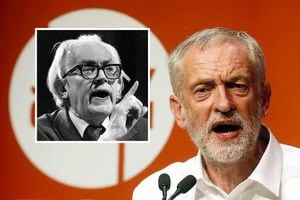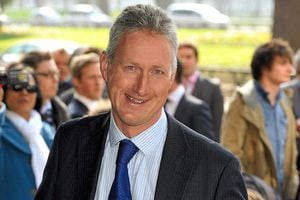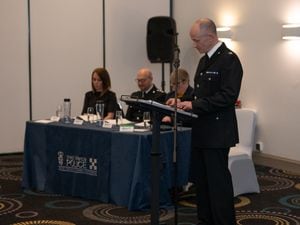Jeremy Corbyn: A question of substance over style?
Mark Andrews reports on the striking similarities between the current Labout leadership race and one from 35 years ago.

After a long, drawn-out election campaign, the new Labour leader is finally announced.
He is not the early front-runner, the safe pair of hands who everybody thought was a shoo-in during the early stages of the campaign. Nor is it the two low-key, unthreatening candidates with hopes of appealing as the compromise choices.

Jeremy Corbyn has always been a fierce political animal, never scared to be controversial and willing to be arrested for his beliefs.
It is perhaps an unlikely characteristic for a man who was brought up in the gentle surroundings of rural Shropshire. The politician recalls the time he left Newport's Adams Grammar School in 1967: "The headteacher's parting comment to me was 'you will never make anything of yourself'."
The man who hopes to become leader of the Labour Party next month says his Shropshire upbringing played a huge role in shaping his political career.
Referring to a running joke with one of his closest supporters, Corbyn says: "Diane Abbott always says to me you learned everything you know in Shropshire, and unfortunately you have forgotten none of it."
Corbyn was born in Chippenham, Wiltshire, the son of electrical engineer David, and maths teacher Naomi. His parents were both left-wing peace campaigners who met during the Spanish Civil War.
They moved to Newport, when Jeremy was seven, and he later attended the prestigious Adams Grammar School. It was not an entirely happy experience.
"He was not noticeably clever," says his old Latin master, Lynton Seymour-Whiteley.
Corbyn says it was during his time at Adams Grammar that his rebellious streak began to emerge.
"I was active in the League Against Cruel Sports in Shropshire," he says. "It's a hunting county, so I was in a minority in my school in being totally opposed to blood sports and shooting for that matter. I remember on Monday mornings at school, one of the teachers would start on about who had been shooting at the weekend. I said 'that's stupid, it's cruel, it's not sport', and the same with hunting and all that. I was kind of in a minority of one, there were lots of arguments at school, I wasn't a very good student. I liked reading about things, doing my own course of study in that sense."
His aversion to the cadet force also landed him in hot water with his teachers.
"We were all supposed to join a cadet force at the age of 15 and prance around in uniform every Wednesday," he recalls. "The big thing was to visit an army camp at some point. I was again in a minority of one and refused to join this thing, so I was put on gardening duties."
Jeremy and his older brother Piers – now a leading weather forecaster – joined the local Wrekin Labour and Young Socialists party. During his time at Adams Grammar he was one of just two Labour supporters when the boys held a mock election in 1964. Friend Bob Mallett recalls Corbyn being jeered by his right-wing schoolmates.
Corbyn left school at 18 with two grade E A-levels. He jokes: "John Major said I was better qualified than him. He got O-levels."
After leaving Adams, he spent two years doing voluntary work in Jamaica. He returned to Britain to study for a degree in Trade Union Studies at North London Polytechnic, but again his rebellious nature hampered his progress. Piers says: "Jeremy had his studies terminated because he had big arguments with the people in charge. He probably knew more than them." Throughout his political career he has been a fierce opponent of grammar schools. It is claimed that his marriage to second wife Claudia ended in 1999 over a row about which school to send their eldest son Ben. Corbyn wanted him to attend nearby comprehensive, Holloway, which was on a list of failing schools, but Claudia chose to send him to a grammar school.
Another example of his devotion to politics came when his mother Naomi died in 1987. Instead of returning home, he chose to attend a political meeting in the Midlands. Piers remembers: "We said, 'Well Mum would have said just get on with it,' so that's what he did."
His "manifesto" for the Labour leadership is as uncompromising as one might expect. His pledges include higher taxes for high earners to finance a "national investment bank" to create jobs, and an end to child tax credits. He is also committed to the renationalisation of the railways and the energy sector, unilateral nuclear disarmament, and an end to the use of private firms by the NHS. His promise to end "zero hours" contracts and a stronger role for unions has predictably gone down well with the party faithful, and he has also called for an end to the "scapegoating of migrants", universal childcare, abolishing student fees and restoring grants.
Whether he will ever get the chance to deliver these policies in government is a matter for debate. But either way, there is no doubting that Jeremy Corbyn is very much a conviction politician – and those convictions were made in Shropshire.
Instead, it is the firebrand maverick, a 60-something in a crumpled shirt who entered the race late in the day, who emerges as the surprise victor having set the contest alight with a radical message that chimes with grass-roots party members.
Jeremy Corbyn in 2015?
Well, no, that was Michael Foot in 1980.
There are many, both inside and outside the party, who feel there are striking parallels between Shropshire-educated Corbyn's surprise emergence as the front-runner in the campaign, and Michael Foot's unexpected win in 1983.
The new Labour leader will be announced on September 12, but so convinced are bookies Paddy Power of a Corbyn victory that they have already paid out £100,000 to those who tipped him.
By contrast, Foot's victory in 1980 took the pundits by surprise. Hot favourite Dennis Healey, who the year before had been Chancellor of the Exchequer, had a clear lead in the first round of voting, with eurosceptic Peter Shore and soft-left John Silkin trailing by some distance. However, when the final ballot was cast – at that time only Labour MPs were allowed to vote – Foot beat Healey by 139 votes to 129.
Initially, it looked like the move had paid off. Healey's forceful, combative personality had made him unpopular with the rank and file, and many MPs saw Foot as the man to unite the warring factions. His unconventional appearance – long, flowing white hair, and unkempt looks – aroused a certain amount of media interest, just as Corbyn's beard and beige shirts do today.
And many saw his fiery oratory as the perfect antidote to his sober-suited rivals. By the end of the week, Labour was enjoying a slender lead in the opinion polls, with Foot's popularity rating comfortably ahead of Margaret Thatcher's.
It was not to last. In January 1981, two months after Foot's election, the Labour Party held a special conference at Wembley, which committed the party to unilateral nuclear disarmament and withdrawal from the European Economic Community (now the European Union).
Labour MPs Dr David Owen – foreign secretary in the previous Labour government – and Bill Rodgers quit the party, along with former MPs Shirley Williams and Roy Jenkins.
Later that month, the so-called Gang of Four announced the formation of the Council for Social Democracy, and in March 1980 they formally announced the launch of Britain's newest party – the Social Democratic Party, or SDP.
The SDP formed a political alliance with the Liberal Party, and surged ahead in the polls. For much of 1981, the Alliance led both Labour and the Tories, at one point even commanding 50.5 per cent of the popular vote.
Liberal leader David Steel was so confident of election victory he told his party's 1981 conference: "Go back to your constituencies and prepare for government!"
While the Alliance never did make it into Downing Street, the breakaway spelled disaster for Labour. The party fought the 1983 election on a 700-page manifesto, which included commitments to unilateral nuclear disarmament, withdrawal from the European Economic Community, abolition of the House of Lords, and the re-nationalisation of privatised industries – not unlike many of Corbyn's pledges – which was branded by Labour MP Gerald Kaufman as "the longest suicide note in history."
The Tories won by a landslide, and Labour's only consolation was that it narrowly held on to second place, gaining a 27.6 per cent share of the vote, compared to 25.4 per cent for the Alliance. Foot was critical of the Alliance, saying it had let the Tories in by splitting the centre-left vote. Nevertheless, the party continued to pick up support from disaffected Labour supporters, and in 1988 the Liberals merged with the SDP to form the Liberal Democrats.
Could electing Corbyn, who grew up in Pave Lane, near Newport, lead to a similar meltdown for Labour today?
Former prime minister Tony Blair certainly thinks so, saying that he actually thinks the consequences will be greater than they were when Foot was leader.
"If Jeremy Corbyn becomes leader it won't be a defeat like 1983 or 2015," he says.
"It will mean rout, possibly annihilation."
While Shrewsbury is among the constituency Labour parties which have pledged their support to Corbyn, many party members have still to make up their mind.
Vernon Bushell, a senior Labour councillor in Shrewsbury, has mixed views.
"A lot of what he says makes sense, but whether he has got the capabilities of leadership and, hopefully a premiership, I don't know. He's certainly leading the field, but whether that is what the public wants remains to be seen."
Ted Clarke, also a councillor in Shrewsbury, says he too is undecided.
"Jeremy Corbyn is offering a clear alternative, but it's hard to say," he says. Regarding whether Corbyn's maverick persona and casual dress sense would make him an easy target for the right-wing media, Councillor Clarke is reluctant to be drawn.
"We will have to wait and see," he says. "The Press are not usually known for their left-wing credentials." Indeed, many activists in the county seem guarded about commenting.
Telford councillor Andy Burford has pledged his support to Jeremy Corbyn, but declined to comment further.
Leader of Telford & Wrekin Council, Councillor Kuldip Sahota, is undecided about how he will vote in the contest, saying he is torn between Andy Burnham and Yvette Cooper. But he urges caution in jumping to conclusions about what a Corbyn-led Labour Party would look like, saying the responsibility of high office might be a moderating factor.
"If Jeremy Corbyn is the leader, we will have to wait and see how he goes forward," he says. "There are times when you have a backbench MP who may have some radical ideas, but they have different views when they take up the responsibilities of leaders. You tend to change your views.
"If he is leader of the Labour Party after 12 months, he might change his views and take it forward from there."
And he says people should be equally wary about making comparisons with Foot's leadership of the party in the 1980s. "That was 35 years ago, it was a different age, we're in 2015 now and the next general election will be in 2020. We will have to wait and see."
He says that Corbyn's entry had certainly given new life to the contest, with thousands of people signing up to the party in order to vote. "I remember some years ago that John Prescott said it was his ambition for the party to get half a million members. We've now got 600,000."
He does concede, though that one factor which hampered Michael Foot's leadership – that he was easy to portray by a hostile media as a bumbling geriatric in a duffel coat – could also count against Corbyn.
"Jeremy Corbyn is 66 now, so if he becomes prime minister he will be 71 by that time," he says. "That is something that could count against him.
"These days they want somebody who comes across as young and dynamic. Ed Miliband had some good policies, but I know he didn't come across as very prime ministerial. It was the same with Iain Duncan Smith, he used to have that cough when he was interviewed."
Veteran Telford Labour campaigner John Evans is an unashamed left-winger. He was a staunch supporter of Michael Foot's leadership, and quit the party after becoming disenchanted with Tony Blair. He says Jeremy Corbyn has rekindled a passion for politics among thousands of people.
"It's not just among the young people, I speak to the working-class people around here, and they are excited about the possibility of Jeremy Corbyn becoming leader," says Mr Evans, who is 80. He says like Foot before him, Corbyn is being unfairly singled out by his critics for reasons more concerned with image than policy.
"They are making a big mistake on age grounds, and talking about how he dresses," he says. "What has that got to do with anything? We have become so shallow in this country. They did the same with Michael Foot, who was a highly regarded academic."
He has a simple message for people such as Tony Blair who say electing Jeremy Corbyn as leader would confine Labour to years, if not decades, in opposition.
"I think the Tories could well get back in again anyway, whoever," he says. "It is the way the country is going, people are becoming more selfish. I think Jeremy Corbyn would be a better bet than the others.
"You have to stick with your principles, even if it means you don't win the election. It's principles first, you can't compromise them simply because it is convenient to you."
There is no doubt that former Shropshire schoolboy Jeremy Corbyn has given life to what otherwise promised to be an otherwise rather unexciting contest. Whether he is the man to lead one of Britain's two major political parties back into government after a decade in the wilderness is a matter which continues to divide opinion.
Lembit: Clear message will attract many Lib Dems too

While there may be some in the Liberal Democrats who think a Jeremy Corbyn-led Labour Party could lead to a resurgence for the Liberal Democrats, Lembit Opik isn't one of them.
The former MP for Montgomeryshire, who was himself sometimes portrayed as a maverick, believes that Corbyn's distinctive and uncompromising message will prove very attractive to many Liberal Democrat voters.
"Since I'm not a Labour Party member I don't feel entitled to direct that party in its choice of leader," he says. "However, what seems clear is Jeremy Corbyn presents the biggest threat to Lib Dem fortunes, due to his combination of radicalism and sheer sincerity."
The former leader of the Welsh Liberal Democrats, who has known Corbyn since 1997, describes the Labour left-winger as "unsinkable".
"Occasionally, a politician comes along who seems to be somehow 'immune' to the usual attacks and slurs which can pull 'mainstream' Parliamentarians down," he says. Indeed, Opik sees something of himself in Corbyn, an MP whose appeal lies in his ability to stand apart from his rivals.
"I've myself have always been left-leaning and intensely libertarian. I tended to vote according to my conscience rather than what I'm ordered to do," he says.
"Mr Corbyn is the same. He's a 'conviction politician,' which means he adheres to his clear, unambiguous political agenda and his words and deeds reflect this."
Opik, who famously called for Nick Clegg to resign as Liberal Democrat leader during his term as deputy prime minister, says the key to Corbyn's appeal lies in his authenticity. "In a world where many MPs appear in some way 'manufactured,' and where a party can be mired by the drifting philosophical bumbling of the leadership – as happened with Clegg and the Lib Dems – Corbyn appears a rare breed," he says. "What makes him very rare indeed is his determination to set out a clear political agenda, regardless of whether his opponents agree with it or not."
And he says that many of Corbyn's core beliefs, which go against current mainstream thinking, could prove popular with many people. "He talks of nationalisation as if it's not a dirty word – because it's not," he says.
"This is anathema to his foes, who are so entrenched in a capitalist free market agenda they cannot imagine any modern elector would be persuaded to go back to, for example, a state-owned railway.
"Corbyn has also offered to apologise for the ill-fated Iraq invasion which occurred under a Labour administration. In so doing, he is simply voicing what millions believe – that the war was wrong."
Opik believes this presents a clear problem for the Liberal Democrats. "The new leader, Tim Farron MP, is largely unsullied by the antics of his ineffectual predecessor and can't be held responsible for much of the corrosion caused by the Clegg team," he says.
"But he must still find a narrative – a story – which differentiates the Lib Dems from all other parties."
And he says by occupying the left of British politics Corbyn can make that much more difficult.
"It means the Lib Dems need to either go ever further left than Labour, or find some middle ground near Labour but still away from the Conservatives," he says.
"It's not easy to see how this can be achieved. Corbyn's Iraq apology would, after all, to some extent match the Lib Dem opposition to Iraq at the time."
He believes there might be more opportunity in terms of social policy.
"Corbyn is a very fair-minded man," says Opik. "Yet there is potential for a fiercely liberty-based agenda to assist the Lib Dems in finding a 'liberal home' on the political map, by going further than Corbyn might go in terms of giving people back their freedoms.
"Yet even this is not entirely in the Lib Dems' hands. If Jeremy emerges as a champion of liberty, then this home also becomes a crowded house."
Opik accuses some of Corbyn's critics of taking an hysterical tone, saying some of the attacks on his personality have been laughable.
He says: "A Twitter site called @CorbynWarnings makes fun of this, suggesting criticisms like: 'Corbyn obsessed with destroying the moon, warns MP'; 'Corbyn's fangs inject a venom which is highly poisonous to humans, warns MP'; and 'Corbyn potentially full of bees, warns MP'. The thing is that even with this, if they're talking about Corbyn, then they're not talking about others, including the Liberal Democrats.
"And he's a genuinely pleasant human being. At a time when the Lib Dems are desperate to regroup, a Corbyn victory could well make this harder."





